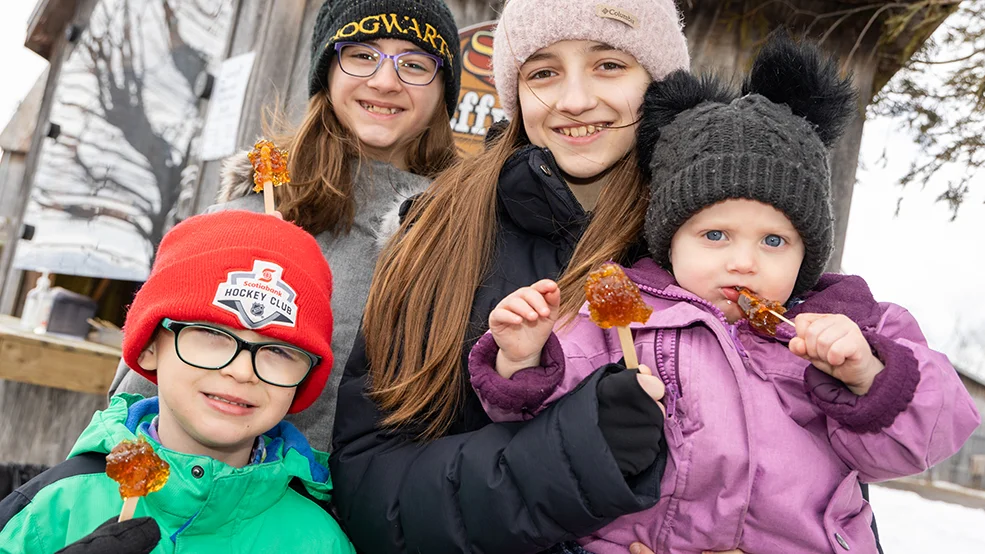Trina Mather-Simard is a status member of Curve Lake First Nation near Peterborough and is a trailblazer in Ottawa’s Indigenous tourism community. She’s also the founder of Mādahòkì Farm, an Indigenous attraction and marketplace dedicated to planning Indigenous-focused events and providing an authentic cultural experience from an Indigenous perspective.
Trina Mather-Simard also launched an organization called Indigenous Experiences in 1998. The organization’s goal was also to create Indigenous-focused events and presentations that highlight the diverse cultures of Canada’s First Nation communities. Trina attended an Aboriginal Tourism conference in Calgary where she was inspired to create Indigenous tourism programming back home in Ottawa. She saw a gap in the industry but recognized that filling the void would require a lot of resources. So, Trina started out small, connecting with established major local events like the Canadian Tulip Festival and Winterlude and pitching complementary Indigenous experiences to the organizers.
Her passion for Indigenous culture—along with a healthy dose of entrepreneurial energy—helped Trina gain momentum. Over time, she bolstered her network of First Nation partners and attracted the attention of like-minded individuals, tourism providers and destination marketing organizations. And in 2000, she was approved to pilot her own event on Victoria Island here in Ottawa.
This became Indigenous Experiences’ main cultural attraction, operating on the island for 18 years until moving to the Museum of History in 2018. The attraction features traditional powwow performances and voyageur canoes on the river among other cultural activities. Notably, it’s the first Indigenous tourism experience to be part of Destination Canada’s Signature Experiences collection.
More recently, Trina fronted the Summer Solstice Indigenous Festival. What started as a one-day event is now a four-day celebration of all aspects of First Nation culture. The festival draws a number of local and national sponsors and plays host to approximately 50,000 attendees annually. Today, the event includes:
- musical entertainment including a national Indigenous music awards ceremony;
- culinary tastings and VIP with Aboriginal chefs; and
- a cultural arts pavilion with a variety of craft workshops.
In 2020, the Summer Solstice Indigenous Festival was forced to shift to a completely virtual experience due to COVID-19 restrictions. Trina focused on making the event as immersive as possible, spreading the programming over 21 days and mailing food kits and craft kits to participants. It was a monumental success, with nearly one-million people from around the world engaging in the content, and the innovative approach has been recognized by local festival organizers and Ottawa’s tourism community.
Connecting with the right people in the right places
From the beginning, Trina recognized the importance of forming strategic partnerships to increase her odds of success. Long before the creation of Mādahòkì Farm, she approached Ottawa Tourism with the idea of adding Indigenous programming to the city’s tourism offerings. A few key representatives saw the potential and helped her fine tune her strategy – she’s been advocating for partnerships ever since.
Now, Trina is heavily involved with Ottawa Tourism and Indigenous Tourism Ontario, and she’s a founding board member and past-chair of the Indigenous Tourism Association of Canada. Her involvement speaks to collaborating with those who share a similar vision and are actively building a relevant audience. It also highlights the importance of establishing partnerships in markets with businesses and attractions that are open and ready to meet consumer demand.
“You want to ensure you’ve checked all boxes beforehand on your end to make partnering as appealing and easy as possible.”
She stresses the importance of having a long-term goal but narrowing your focus on the small steps it takes to get there. With Indigenous Experiences, Trina knew an international traveller was unlikely to book a trip specifically to attend one of her events. So, she uncovered the places and attractions with the most attention; then she connected with those businesses and organizers to find ways to work together to bring Indigenous programming to tourists.
Keeping things in perspective
If you’re just getting started, Trina advises being realistic and beginning with what’s manageable. Indigenous Experiences wasn’t a massive success at first – it began as an idea and a few conversations with the right people. The business grew over time with the help of a network of collaborators, opening the door to a wealth of possibility.
She encourages partnerships not only with businesses and associations but also with locations, such as Parks Canada or Provincial Parks.
“Lots of really successful microbusinesses tie into tourism. That’s what’s great about tourism – it can be one person with a lot of traditional knowledge. Knowledge about the forest, for example. You don’t have to own the forest, but you can partner to offer guided medicine tours.”
Finally, Trina is quick to highlight that there is more demand for Indigenous tourism experiences and attractions such as Mādahòkì Farm than there are tourism operators and attractions offering them. Meaning, there is a lot of opportunity to enrich tourism by sharing the stories and cultures of First Nation communities. If you’re keen to learn how to get involved, she suggests taking advantage of the support provided from the Indigenous tourism associations throughout Canada.
This article was written for the Indigenous Tourism Entrepreneurship Training (ITET) project developed by Ottawa Tourism and Algonquin College, made possible through funding from the Government of Canada. To learn more about ITET please visit www.storytotell.ca. &






